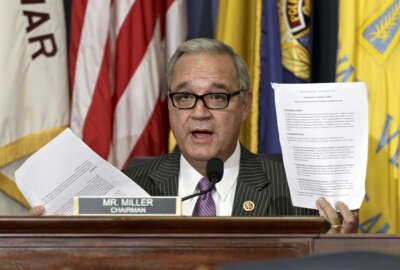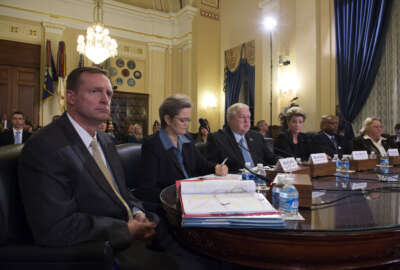
Groups praise VA bill for ‘breakthrough’ whistleblower protections
Several good government and oversight organizations, along with eight individual whistleblowers, wrote to House Veterans Affairs Committee Chairman Jeff Miller...
Whistleblower protection provisions included in a new bill that cleared the House this week are earning praise from several good government and oversight groups. But they’re concerned that some accountability provisions will ultimately weaken public service due process rights.
The Project on Government Oversight, Sunlight Foundation and Government Accountability Project, along with 13 other organizations and eight individual whistleblowers, wrote to the bill’s sponsor, House Veterans Affairs Committee Chairman Jeff Miller (R-Fla.).
The VA Accountability First and Appeals Modernization Act would create an Office of Accountability and Whistleblower Protection within VA, led by a presidential appointee. This person, under the title of assistant secretary for accountability and whistleblower protection, would receive and refer whistleblower cases, in addition to tracking, reviewing and implementing recommendations based on complaints and inspector general investigations on accountability issues.
“[This section of the bill] is a major breakthrough in the struggle for VA whistleblowers to gain credible rights when defending the integrity of the agency mission and disclosing quality of care concerns,” the organizations wrote in a Sept. 9 letter. “Further, it would provide a system to hold employees accountable for their actions when they retaliate against those exposing waste, fraud and abuse.”
The legislation also includes a chain of command for employees to submit their complaints to their supervisors, as well as performance review guidelines that evaluate how well managers respond to whistleblower issues.
Specifically, the groups praised the bill for integrating the Office of Special Counsel and whistleblower ombudsman into annual VA training on employee rights and procedures. They also supported language that closes loopholes for whistleblower retaliation and tougher consequences for supervisors who violate the law.
But the groups said they had concerns about the bill’s provisions that “weaken due process.”
“Along with whistleblowing, due process rights exist to protect the merit system as the essential foundation for non-partisan, professional public service,” they wrote. “The new standards would permit termination or other discipline based on mere ‘substantial evidence,’ which means ‘more than a scintilla,’ or crumb. A de facto ‘at will’ employment system could create vulnerability to political patronage and corruption greater than any time since 1882 when the civil service system was created.”
The groups are referring to a change in the law that would apply to senior executives.
The legislation lets senior executives appeal disciplinary actions through the Senior Executive Disciplinary Appeals Board rather than the Merit System Protection Board. The VA Secretary would appoint three department employees to sit on the board, review appeals cases and make a decision within 21 days.
“The Board shall uphold the decision of the secretary if there is substantial evidence supporting the decision and the applicable personnel action is within the tolerable bounds of reasonableness,” the bill said.
But those due process rights are “not mere red tape to protect bureaucrats,” the organizations argued.
Some provisions in the accountability bill are likely in reaction to a series of recent cases where MSPB recently overturned punishments for three senior executives, sparking frustration for both members of Congress and senior VA leaders.
Currently, MSPB administrative judges must use an evidentiary burden of proof to settle SES disciplinary appeals cases within 21 days. VA said in June that it was no longer using this expedited hiring authority following a recent decision from the Justice Department.
Copyright © 2025 Federal News Network. All rights reserved. This website is not intended for users located within the European Economic Area.
Nicole Ogrysko is a reporter for Federal News Network focusing on the federal workforce and federal pay and benefits.
Follow @nogryskoWFED
Related Stories






